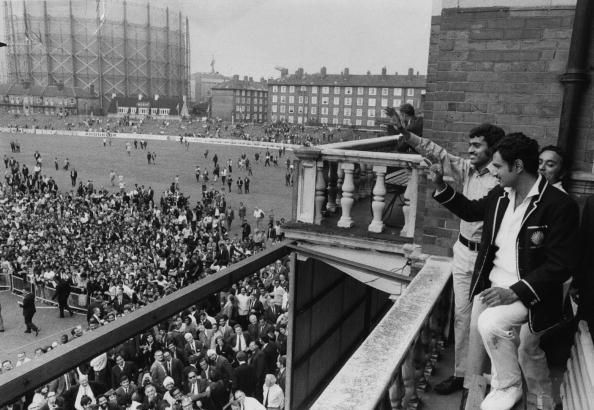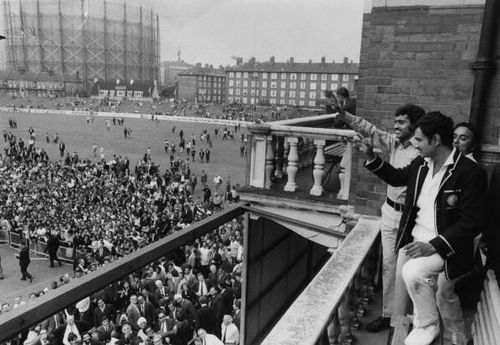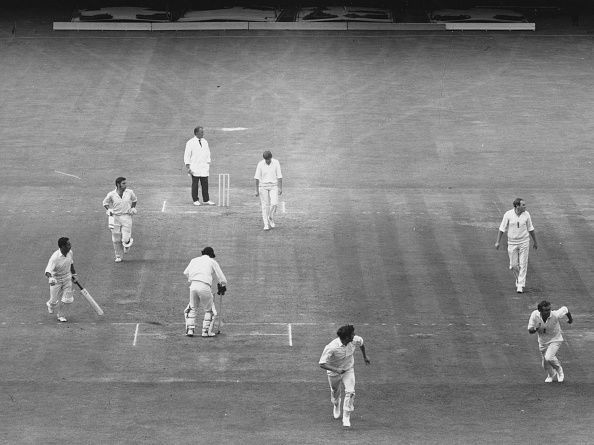
India-England 1971 Oval: 22 Tests for a victory on the 22 yards in Old Blighty

I can only imagine the joy that Indian cricket fans would have felt on reading the newspaper on August 25th, 1971. For, on the previous day, the Indian team had emerged victorious in a Test match in England for the first time in 22 Test appearances. And this was a generation in India which was still trying to get over the colonial influence.
What made the victory special?
While ‘firsts’ in life are always special, be it your first love, first job or first Test victory in England as in this case. But the fact that it had come against the creators of the game of cricket in their own backyard made it even more special.
The Indian team which had come for the tour to England in 1971 was a confident bunch having just won a series in the Caribbeans for the first time. The visitors made a good start winning five tour games while losing just one prior to the first Test. Rain played a role in the first two drawn Tests and both the teams arrived at Oval for the third hoping for a series win.
English skipper Ray Illingworth won the toss and the home team scored 355 runs with half centuries from John Jameson (82), Alan Knott (90) and Richard Hutton (81). In response, the Indians lost openers Ashok Mankad and Sunil Gavaskar early and it took a third wicket partnership of 93 runs between captain Ajit Wadekar (48) and Dilip Sardesai (54) to get them out of trouble. Farokh Engineer (59) and Eknath Solkar (44) then put a solid sixth wicket partnership of 97 runs.
Despite these contributions, Indians were bowled out for 284 runs, thus conceding a first innings lead of 71 runs. At this moment, most of the Indian supporters would have thought that another Test loss was in store for their team.
However, a gentleman by the name Bhagwat Chandrasekhar had other ideas. In the second innings, after the home team lost John Jameson via a runout, Chandra (as he is fondly called), came into the fore. He dismissed John Edrich and Keith Fletcher in successive deliveries and would have taken a hat-trick had it not been for a drop catch by Dilip Sardesai.
“Mill Reef daalo”
Interestingly, it was Sardesai who had played a unique role in Chandra’s first wicket in England's second innings. He had suggested the leg-spinner to bowl a quicker one to Edrich. Sardesai had said, “Mill Reef daalo (bowl a Mill Reef).” Now you wonder what was this ‘Mill Reef’ that Sardesai was referring to?
Both Sardesai and Chandra were fond of putting money in horse racing. There was one particular horse named - ‘Mill Reef’ on whom the duo had been betting on during the tour. Chandra was known for his quicker delivery, so whenever Sardesai used to see the leg-spinner bowl a faster one, he used to be reminded of Mill Reef.
“Halfway through in to the run up, I changed my grip and bowled the faster one.”
About this delivery, Chandra is quoted in a recently released book on the Indian spin quartet - Fortune Turners, “Half way through in to the run up, I changed my grip and bowled the faster one.” Edrich was unable to get his bat down in time and was out bowled.
Chandra continued his brilliance and when he had the English skipper Illingworth caught and bowled for just four runs, the home team were struggling at 65 for six. Eventually, the home side was bowled out for 101 runs with Chandra picking up six wickets.
This meant that India had a realistic chance of winning a series in the Old Blighty if they could chase 173 runs in the fourth innings. Openers Gavaskar and Mankad were again dismissed early and for the second time in the match Wadekar and Sardesai bailed out the Indians. After their dismissal, Gundappa Viswanath and Farokh Engineer stitched together a small partnership of 36 runs to bring the team closer to victory.
And when Abid Ali hit the winning runs, history had been made. India had won the match four wickets and with it the series as well. Chandra was the hero of the match as it was his spell that had set up the victory.

This spell also won him the Wisden award for ‘Best bowling performance of the century’ for India at a function held in London in 2002. This match has been written forever in golden letters in the history of Indian cricket. Even today, just mention ‘1971 Oval’ to an Indian cricket fan and you will hear stories aplenty about the match.
Also see - Live cricket score